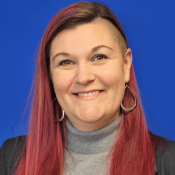
As young children, so many of us trace our earliest encounters with language through nursery rhymes, fairy tales and stories. Often, our first attempts to produce writing mimic those initial encounters as we play with language and see what we can make it do. Then, at some point, we learn that, like us, our writing must grow up, and we must put aside the fantasy of becoming the next great author or poet (though I still maintain my fourth-grade poem about pandas is an underappreciated literary masterpiece). But why must we stop indulging ourselves in the magic that happens when we play with language?
Society today pushes many talented young writers and artists into trajectories that force them to nurture their creativity during their free time. Recently, I spoke with a man in his sixties who, after a long career in finance, finally decided to give serious time and attention to his poetry.
He regretted having waited so long.
This April marked my first National Poetry Month as dean of English and humanities at Lincoln Land Community College, and I was delighted to celebrate it by watching our new creative writing program come to life. I was also a little sad that I missed the exciting conversations among our passionate faculty and students that led us to this moment.
So, I asked our faculty to tell me why now is the perfect time for creative writing at LLCC and what makes us (and our program) special.
Dr. Deborah Brothers, longtime professor of English, told me, “What I think sets LLCC’s program apart is how we think about creative writing. It doesn’t just mean someone is writing fiction, and if they are writing fiction, it doesn’t mean that fiction has to be fantasy. Creative writing incorporates genre awareness — and the wide variety of genres — and it helps writers cultivate strategies to make any genre of writing become more alive, aware and compelling to readers.”
When we bring students together, all of whom come from unique backgrounds and life experiences that shape their writerly voices, to cultivate these skills, they form writing communities. Professor of English J. Eric Stachera describes the “bonds” students form with each other and with their faculty: “Each workshop becomes a community where constructive feedback and encouragement to develop go hand in hand.”
But our creative writing program doesn’t just involve writing (though there’s plenty of that). John Paul Jaramillo, novelist and professor of English, explains, “We prepare students as professional writers and editors with … new course offerings, including our newest course, Literary Writing, Editing, Publishing in the Digital Age.” So, students can explore and nurture their talents across genres — including fiction, poetry and creative nonfiction — but they can also learn the editing and technical production of publishing with today’s digital tools.
For me, one immeasurable benefit our students at LLCC enjoy is the mentorship from an exceptionally talented group of faculty. Our courses are taught by writers trained in their specialties and whose works have been published in literary journals and with literary presses. This is a rarity for creative writing programs at community colleges. LLCC faculty live the passions they teach and mentor the next generation of voices from the prairie state and beyond.
I considered beginning this article with a disclaimer that went something like this: “Warning: Although I have had a poem or two published, I am not a creative writer.”
This warning reminded me of what I tell people when they ask what I do for a living. “I teach writing,” I say, “but not the creative kind.”
I don’t want others to confuse the writing I teach (the academic and technical stuff) with the other kind of writing, the kind that takes real talent. Talent I simply don’t possess.
From my faculty writers, novelists, essayists, dramatists and poets, I’ve learned that it’s not innate talent that makes a creative writer. Creative writing requires passion, patience, curiosity, persistence, perspective, originality and a willingness to explore the full depth of emotions central to the human experience and channel all of that onto the page or screen.
Here at LLCC, we invite you to come explore, play and learn more about what you can do with language. Even if it’s just a poem about pandas.
Learn more at creative writing.
